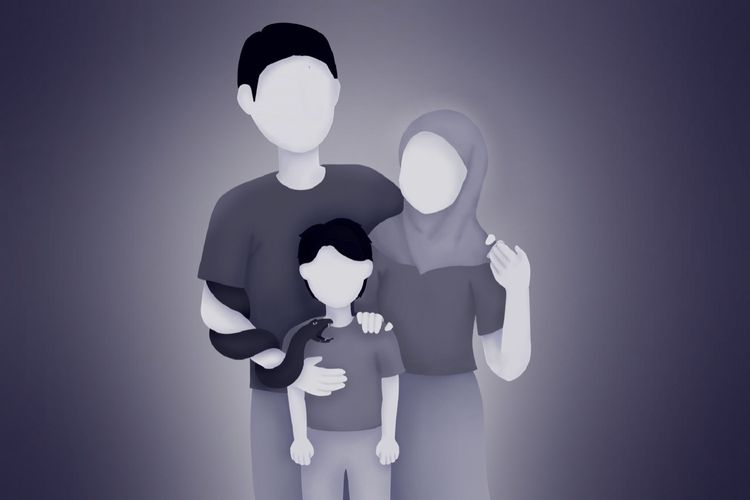Anti-Domestic Violence Law in Indonesia: Boon or Bane?

KOMPAS.com - From what she had known from her friends' married life, Novi always felt that she could also have a white marriage, which is based on sincere affection and pure love.
A few years ago, before her wedding with her fiance, Badu (not the real name), Novi remembered well she then diligently checked the to-do lists from administrative paperwork to the Dangdut singer she booked would not stray on the way to her house or even got the wedding date wrong.
She prepared it so well although it was not a grand wedding reception because as a cook and waitress in a food stall in Bekasi near Jakarta, Novi did not earn much, so did Badu, who earned an even lower salary than hers.
But, she was quite pleased as she was going to get married. More importantly, she was going to marry someone with whom she had a love story for two years.
However, not too long after the wedding, her marriage turned out to be unexpected.
Also read: Millennials Need Special Attention in Combatting Drug Abuse: Indonesian Vice-President
In the first year of marriage, Badu wanted Novi to find another job that did not involve night shifts and weekends so that Novi could stay at home to take care of the household. In other words, Badu wanted Novi to spend as much time with him as possible. It was for the first time Novi saw the other side of marriage.
“The longer it went on, the more I could be tamed. And I did not know why, I felt even more afraid to refuse," said Novi.
Novi had always known that Badu often hung out with his friends until late at the place close to Badu's old rented house in Bekasi city. One day for the first time, in the middle of dawn, Novi's door was pushed so hard that she woke up only to find her husband lying on the sofa rambling, clutching his dizzy head.
"His breath smelled of bad alcohol," explained Novi.
The next minute when Novi was about to support Badu's body, her hair was suddenly grabbed for no reason. The incident did not stop there. From that night, Badu continued to treat her worse. Badu would use a plastic gallon container or a wooden chair to vent his emotions by hitting Novi. The bruises did disappear after a few weeks, but the worst injuries were not even on Novi's physique but her psyche.
Also read: Online Abuse Driving Girls Off Social Media Platforms: Study
It was also around this time that Badu began to despise Novi, blaming her for their previous financial decisions and claiming that Novi was incompetent and incapable of making decisions. All of their decisions had been disastrous. Novi believed that Badu was only jealous of her achievements and humiliating her was Badu's way of overcoming his shortcomings.
Later on, Badu also demanded Novi transfer all of her salaries to him, not letting Novi manage the money earned by her hard work. As for Badu, he was free to spend his and the rest of Novi's salary as he wished. Feeling like a slave—working long hours, constantly being watched, and having to give up her salary—Novi threw back memories of how she felt about marriage a few years ago.
The situation became unbearable for Novi. She then decided to stay for a night in a friend’s place. A coworker encouraged her to get help from social services, but Novi was not someone who could open herself up to people she did not know, especially because what she had to do was to report her husband to the authorities.
Forms of domestic violence
Public attorney in legal aid LBH APIK Jakarta, Tuani Marpaung, explained that the forms of domestic violence are divided into several categories such as physical violence, psychological violence, and violent economic neglect.
Also read: Jakarta Police Arrest Two Ex-Starbucks Employees for Online Sexual Harassment
Citing an example, Tuani said that physical violence is an act that causes cuts or bruises or other physical injuries such as being hit, punched, grabbed, and leaving scars. Meanwhile, psychological violence includes degrading dignity, making people depressed, such as not being given the right to do something and being deprived of their independence as a partner. And violent economic neglect turns out to be very common in Indonesia, where a person is not supported financially, left without clarity, and others.
“There is no minimum and maximum limit for economic neglect. For example, today he gave 100,000 Indonesian rupiahs ($7) to be managed for two months. It is not necessarily economic neglect because there are no set rules. There is no minimum, so often cases of economic neglect are difficult to process,” explained Tuani.
Novi was not alone. Almost one-third of women aged 15-49 years who have been in a relationship report to the World Health Organization (WHO) that they have been subjected to some form of physical and/or sexual violence by their intimate partner.
This type of violence is often raised and found in many soap operas that air at nine o'clock at night on television, but people do not expect to experience it in real life. Worse still, domestic violence with the perpetrator being family or partner is considered a private matter, and what happens in it is not someone else's business, so many victims do not feel the need to report the case, even when similar cases have been experienced repeatedly.
 Illustration of domestic violence.
Illustration of domestic violence.Meeting with Novi
When I visited Novi’s house in West Bekasi, she smiled as she invited me in. Located on the side of the road, it absolutely could not be judged safe from any aspect for a person who has an active toddler. Her son, Jaki as he was nicknamed, gave me the look as if he had seen me somewhere.
The walls were almost plain as in there were no photos or any ornaments displayed. There was only a wall clock his employer had given her, hanging in the middle of the wall. It was 11 am. Novi invited me to sit down while she went to her room for a while. Accompanying me, Jaki, who stood some distance away, hiding half of his body behind the bedroom door.
There was one area in her house which until now she has not been able to go to. Even looking at it, Novi would prefer to turn around. It was the corner of the only bedroom, more precisely at the angle perpendicular to the door bolt. It was the place where Badu lost control of his sanity after drinking alcohol.
"A friend told me that I could report it, it's just… I was afraid. If I were to report, it would not necessarily be processed. If it were to be processed, it would not turn out necessarily fair,” said Novi.
"Besides, I used to hurt myself when I stressed. I think if I were to do visum [post mortem report]—I think that’s what you call it—that could be an advantage for Badu not to confess."
At the end of my meeting with Novi, she gave me Badu’s numbers. I immediately contacted him that same afternoon, and surprisingly, he read it right away. But, he blocked my number soon after my long message was sent.
Legal process
For domestic violence cases, the settlement process often only prioritizes legal aspects and marginalizes justice for victims. Law enforcement officers will only see the criminal element in handling a case. If it is fulfilled, then it will immediately be processed. It is not uncommon for officers to be unable to distinguish between victims and perpetrators. The good faith of victims to report their cases was not very welcomed. For example, victims are given a lot of burdens to fulfill the normative elements in criminal offenses and do not receive adequate assistance and information about legal matters.
“In our current procedural law, so far victims are always asked to prove their case, for example looking for witnesses, evidence and so on. It means that they are already a victim but they must prove it. I mean, the victim is already traumatized,” Tuani said.
Also read: Two Foreigners Get Death Sentences for Violating Indonesia’s Narcotics Law
As a result, many victims become discouraged when they want to fight for their rights through the legal process. Added to this is the stigma from the family to the victim, such as being accused of being against her husband and spreading disgrace due to domestic disputes. Because of this, victims often stop the ongoing legal process even though it is already in court.
"Speaking of the legal process, it is not easy. Many domestic violence cases take two to three years to finalize and the victims become weary of it. There are some—even a lot of—cases that are suddenly dismissed after those long waits that we had to file another legal action. File a pre-trial so that the case could be reopened,” said Tuani.
Based on data from LBH APIK Jakarta in 2019, the most reported cases were related to domestic violence. There were 249 cases. However, of that number, only 15 cases were then reported to the police. Also, most victims of psychological violence do not report their cases. The reason was that the victim was unable to pay one of the prerequisites, namely post mortem psychiatricum.
The success of a legal process is also largely determined by the quality of understanding and response of law enforcement officers in handling legal cases and protecting victims, including female victims, following the mandate of laws and regulations.
However, the most perceived obstacle at this time is the lack of a common gender-responsive perception among law enforcement officers regarding the evidence of complex cases of violence, protection mechanisms for witnesses and victims, and coordination in the fulfillment of victims' rights. This also results in a lack of response to victims who are traumatized by the violence itself.
"Our law enforcement officers' perspective equates perpetrators to the victims. They should be able to be more empathetic when interviewing victims,” Tuani said of her experience.
"And the cases of women and children are also not cases that generate a lot of money, unlike drug or narcotics cases. Especially cases of girls that cannot be exposed, so in practice officers are often a bit reluctant to handle it.”
Simak breaking news dan berita pilihan kami langsung di ponselmu. Pilih saluran andalanmu akses berita Kompas.com WhatsApp Channel : https://www.whatsapp.com/channel/0029VaFPbedBPzjZrk13HO3D. Pastikan kamu sudah install aplikasi WhatsApp ya.






























